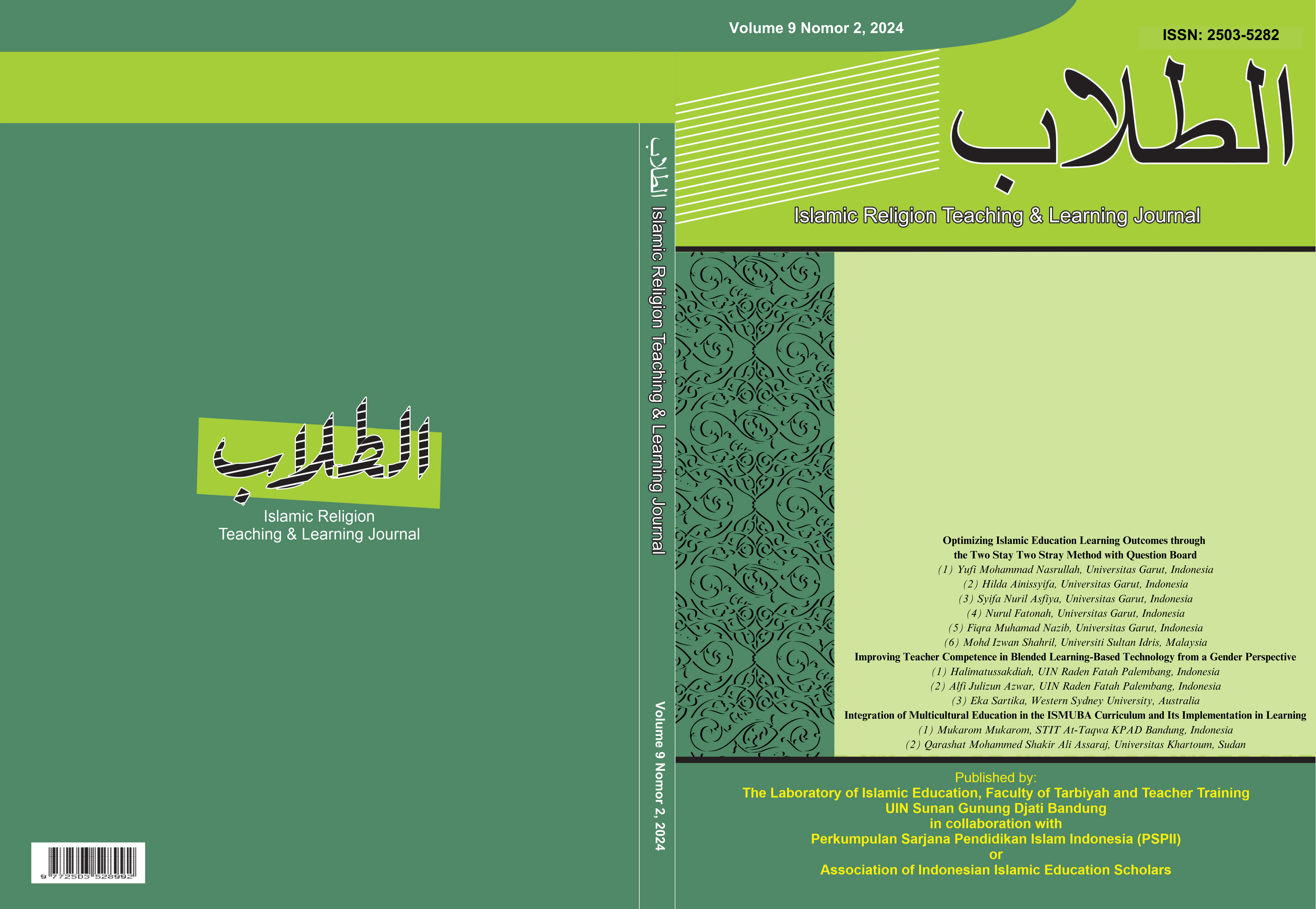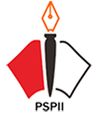Islamic Religious Education in Public Universities: Responding to Contemporary Challenges
DOI:
https://doi.org/10.15575/ath.v9i2.33030Keywords:
Challenges, Education, Higher EducationAbstract
This research aims to explore the management of Islamic Religious Education (PAI) in public universities, particularly at Advanced Indonesia University (UIMA), and to identify efforts to enhance its effectiveness in instilling moral and religious values relevant to current developments. The research adopts a qualitative approach with a descriptive method to provide a systematic overview of the factors influencing the success of PAI, including both teaching aspects and supporting infrastructure. The study identified several challenges, including variations in religious education models, the need to integrate the inclusive spirit of Islamic teachings, educator professionalism, and the limitations in religious infrastructure. Proposed solutions include strengthening the curriculum based on the fundamental values of the Qur'an and Sunnah, alongside a holistic approach that not only focuses on academics but also on character and ethics formation. Additionally, the development of facilities, such as mosques, is expected to support increased religious activities. The conclusion of this research is that the management of PAI at public universities, like UIMA, requires an integrated approach that blends academic knowledge with support from various stakeholders to foster a competitive and character-building Islamic education. Penelitian ini bertujuan untuk mengeksplorasi tantangan dalam pengelolaan Pendidikan Agama Islam (PAI) di perguruan tinggi umum, khususnya di Universitas Indonesia Maju (UIMA), serta upaya untuk meningkatkan efektivitasnya dalam menanamkan nilai-nilai moral dan agama yang relevan dengan perkembangan zaman. Penelitian ini menggunakan metode kualitatif dengan pendekatan deskriptif untuk menyusun gambaran sistematis mengenai faktor-faktor yang memengaruhi keberhasilan PAI, baik dari aspek pengajaran maupun infrastruktur pendukung. Hasil penelitian mengidentifikasi berbagai tantangan, termasuk model pengembangan pendidikan agama yang berbeda, pentingnya integrasi semangat inklusivitas ajaran Islam, profesionalisme pendidik, dan keterbatasan sarana prasarana keagamaan. Solusi yang diusulkan mencakup penguatan kurikulum dengan dasar nilai-nilai fundamental Al-Qur’an dan as-Sunnah, serta adopsi pendekatan holistik yang tidak hanya mencakup aspek akademis tetapi juga pembentukan karakter dan etika mahasiswa. Selain itu, pengembangan sarana seperti masjid diharapkan dapat mendukung peningkatan aktivitas keagamaan. Kesimpulan dari penelitian ini adalah bahwa pengelolaan PAI di perguruan tinggi umum, seperti UIMA, tidak hanya membutuhkan pendekatan yang terintegrasi dengan ilmu pengetahuan umum, tetapi juga dukungan dari berbagai pihak untuk mencapai pendidikan Islam yang berdaya saing dan berorientasi pada pembentukan karakter Islami.References
Alhamuddin, Murniati, A., Surbiyantoro, E., & Mulyani, D. (2021). Developing core competencies for Islamic higher education in Indonesia in the era of industrial revolution 4.0. Jurnal Pendidikan Islam Indonesia, 5(2), 136–152. https://doi.org/10.35316/ jpii.v5i2.279
Anderson, T., & Vargas, P. R. (2020). A critical look at educational technology from a distance education perspective. Digital Education Review, 37, 208–229. https://doi.org/https://doi.org/10.1344/der.2020.37.208-229
Apriani, D., Williams, A., Rahardja, U., Khoirunisa, A., & Avionita, S. (2021). The Use of Science Technology In Islamic Practices and Rules In The Past Now and The Future. International Journal of Cyber and IT Service Management, 1(1), 48–64. https://doi.org/https://doi.org/10.34306/ijcitsm.v1i1.16
Aspers, P., & Corte, U. (2019). What is qualitative in qualitative research. Qualitative Sociology, 42, 139–160. https://doi.org/https://doi.org/10.1007/s11133-019-9413-7
Astomo, P. (2021). Legal Politics of Responsive National Education System in the Globalization Era and the Covid-19 Pandemic. Yuridika, 36(2), 401–426. https://doi.org/10.20473/ydk.v36i2.25897
Blettler, M. C. M., Abrial, E., Khan, F. R., Sivri, N., & Espinola, L. A. (2018). Freshwater plastic pollution: Recognizing research biases and identifying knowledge gaps. Water Research, 143, 416–424. https://doi.org/https://doi.org/10.1016/j.watres.2018.06.015
Chandra, P. (2020). Problematika, tantangan dan peluang pendidikan agama islam di sekolah dan perguruan tinggi di era globalisasi. Jurnal Aghniya, 3(1), 124–136.
Dian, D., Indayanti, A. N., Fanani, A. I., & Nurhayati, E. (2023). Optimizing Islamic Religious Colleges In Facing The Era of Globalization. Tafkir: Interdisciplinary Journal of Islamic Education, 4(1), 58–77. https://doi.org/https://doi.org/10.31538/tijie.v4i1.326
Djazilan, M. S., & Hariani, M. (2022). Implementation of E-Learning-Based Islamic Religious Education. Bulletin of Science, Technology and Society, 1(2), 14–21.
Enstedt, D. (2022). Religious literacy in non-confessional religious education and religious studies in Sweden. Nordidactica: Journal of Humanities and Social Science Education, 12(1), 27–48.
Fuadi, A., & Suyatno, S. (2020). Integration of Nationalistic and Religious Values in Islamic Education: Study in Integrated Islamic School. Randwick International of Social Science Journal, 3(1), 555–570. https://doi.org/https://doi.org/10.47175/rissj.v1i3.108
Heri, D., & Ruswandi, U. (2022). Konsep Integrasi Nilai-Nilai Keislaman Dalam Pembelajaran Pendidikan Agama Islam pada Lembaga Pendidikan. Jurnal Dirosah Islamiyah, 4(2), 255–267. https://doi.org/https://doi.org/10.47467/jdi.v4i2.920
Ilham, D. (2020). The Challenge of Islamic Education and How to Change. International Journal of Asian Education, 1(1), 9–20. https://doi.org/https://doi.org/10.46966/ijae.v1i1.16
Khaidir, E., & Suud, F. M. (2020). Islamic education in forming students’ characters at as-shofa Islamic High School, pekanbaru Riau. International Journal of Islamic Educational Psychology, 1(1), 50–63. https://doi.org/https://doi.org/10.18196/ijiep.1105
Komariah, N., & Nihayah, I. (2023). Improving the personality character of students through learning Islamic religious education. At-Tadzkir: Islamic Education Journal, 2(1), 65–77. https://doi.org/https://doi.org/10.59373/attadzkir.v2i1.15
Kurniati, N., & El-Yunusi, M. Y. M. (2023). Methods for Cultivating Students’ Personality and Morals Through Islamic Religious Education. Bulletin of Science, Technology and Society, 2(2), 25–30.
Lenggogeni, P., & Mudjiran, M. (2024). Urbane Reality: Social Footprints of Teenagers and the Search for Solutions to Deviant Behavior at VHS 5 Padang. International Journal of Educational Dynamics, 6(2), 494–500. https://doi.org/https://doi.org/10.24036/ijeds.v6i2.487
Lobe, B., Morgan, D., & Hoffman, K. A. (2020). Qualitative Data Collection in an Era of Social Distancing. International Journal of Qualitative Methods, 19, 1609406920937875. https://doi.org/https://doi.org/10.1177/1609406920937875
Marfiyanto, T. (2018). Curriculum Tranformation of Islamic Religious Education. EDUTEC: Journal of Education And Technology, 2(1), 12–22. https://doi.org/https://doi.org/10.29062/edu.v2i1.19
Mengki, J., & Azhar, A. (2023). Comparative Study of PAI in Schools in The 2013 and Independent Curriculum. Innovative: Journal Of Social Science Research, 3(2), 9563–9573.
Moser, A., & Korstjens, R. (2018). Series: Practical guidance to qualitative research. Part 3: Sampling, data collection and analysis. European Journal of General Practice, 24(1), 9–18. https://doi.org/https://doi.org/10.1080/13814788.2017.1375091
Muhammad, G., Ruswandi, U., Nurmila, N., & Zakiyah, Q. Y. (2023). Implementation of Multicultural Values through the Hidden Curriculum of PAI Subjects in Forming a Peace-loving Character in Junior High Schools. European Journal of Education and Pedagogy, 4(6), 113–120. https://doi.org/https://doi.org/10.24018/ejedu.2023.4.6.768
Nasir, M., Hamzah, S. H., & Rijal, M. K. (2021). Anatomical analysis of Islamic religious education curriculum at general higher education in Indonesia. Ta’dib, 24(1), 53–69. https://doi.org/https://dx.doi.org/10.31958/jt.v24i1.2827
Nuryana, Z., & Fauzi, N. A. F. (2020). The fiqh of disaster: The mitigation of Covid-19 in the perspective of Islamic education-neuroscience. International Journal of Disaster Risk Reduction, 51, 101848. https://doi.org/https://doi.org/10.1016/j.ijdrr.2020.101848
Pike, M. A., Hart, P., Paul, S. A. S., Lickona, T., & Clarke, P. (2021). Character development through the curriculum: teaching and assessing the understanding and practice of virtue. Journal of Curriculum Studies, 53(4), 449–466. https://doi.org/https://doi.org/10.1080/00220272.2020.1755996
Rahim, R. (2020). Problematika Pendidikan Agama Islam Di Perguruan Tinggi Umum (PTU). Jurnal Andi Djemma| Jurnal Pendidikan, 3(1), 49–58. https://doi.org/https://doi.org/10.35914/jad.v3i1.337
Siedlecki, S. L. (2020). Understanding Descriptive Research Designs and Methods. Clinical Nurse Specialist, 34(1), 8–12. https://doi.org/10.1097/NUR.0000000000000493
Sukmayadi, V., & Yahya, A. (2020). Indonesian education landscape and the 21st century challenges. Journal of Social Studies Education Research, 11(4), 219–234.
Ubaidillah, M. B., Abas, E., Supriyanto, A., Jalil, M. A., Dahlan, M. Z., & Solong, N. P. (2023). Penanaman Karakter Disiplin dan Tanggung Jawab Mahasiswa melalui Pembelajaran Pendidikan Agama Islam di Universitas Mayjen Sungkono. Jurnal Pendidikan Tambusai, 7(2), 12996–13002.
Ucan, A. D., & Wright, A. (2019). Improving the pedagogy of Islamic religious education through an application of critical religious education, variation theory and the learning study model. British Journal of Religious Education, 41(2), 202–217. https://doi.org/https://doi.org/10.1080/01416200.2018.1484695
Walker, S., & Graham, L. (2021). At risk students and teacher-student relationships: student characteristics, attitudes to school and classroom climate. International Journal of Inclusive Education, 25(8), 896–913. https://doi.org/https://doi.org/10.1080/13603116.2019.1588925
Wu, L., Wang, D., & Evans, J. A. (2019). Large teams develop and small teams disrupt science and technology. Nature, 566, 378–382. https://doi.org/https://doi.org/10.1038/s41586-019-0941-9
Yuliah, E. (2020). The Implementation of Educational Policies. Jurnal At-Tadbir: Media Hukum Dan Pendidikan, 30(2), 129–153.
Zulkifli, Z., & Setiawan, A. (2020). The Analysis of Student Learning Interest in Islamic Education (PAI) Course at Public Universiti in Bontang. El-Buhuth: Borneo Journal of Islamic Studies, 3(1), 21–38. https://doi.org/https://doi.org/10.21093/el-buhuth.v3i1.2781
Downloads
Published
How to Cite
Issue
Section
License
Authors who publish with this journal agree to the following terms:
- Authors retain copyright and grant the journal right of first publication with the work simultaneously licensed under a Creative Commons Attribution-ShareAlike License that allows others to share the work with an acknowledgement of the work's authorship and initial publication in this journal.
- Authors are able to enter into separate, additional contractual arrangements for the non-exclusive distribution of the journal's published version of the work (e.g., post it to an institutional repository or publish it in a book), with an acknowledgement of its initial publication in this journal.
- Authors are permitted and encouraged to post their work online (e.g., in institutional repositories or on their website) prior to and during the submission process, as it can lead to productive exchanges, as well as earlier and greater citation of published work (See The Effect of Open Access).






